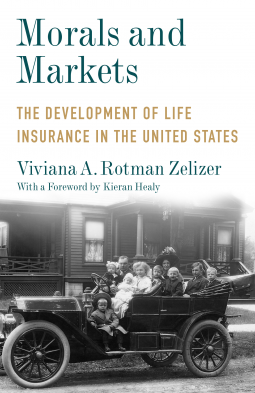
Morals and Markets
The Development of Life Insurance in the United States
by Viviana A. Rotman Zelizer
This title was previously available on NetGalley and is now archived.
Buy on Amazon
Buy on BN.com
Buy on Bookshop.org
*This page contains affiliate links, so we may earn a small commission when you make a purchase through links on our site at no additional cost to you.
Send NetGalley books directly to your Kindle or Kindle app
1
To read on a Kindle or Kindle app, please add kindle@netgalley.com as an approved email address to receive files in your Amazon account. Click here for step-by-step instructions.
2
Also find your Kindle email address within your Amazon account, and enter it here.
Pub Date Aug 08 2017 | Archive Date Aug 29 2017
Description
Life insurance—the promise of an insurer to pay a sum upon a person's death in exchange for a regular premium—is a bizarre enterprise. How can we monetize human life? Should we? What statistics do we use, what assumptions do we make, and what behavioral factors do we consider? First published in 1979, Morals and Markets Is a pathbreaking study exploring the development of life insurance in the United States. Viviana A. Rotman Zelizer combines economic history and a sociological perspective to advance a novel interpretation of the life insurance industry. The book pioneered a cultural approach to the analysis of morally controversial markets.
Zelizer begins in the mid-nineteenth century with the rise of the life insurance industry, a contentious chapter in the history of American business. Life insurance was stigmatized at first, denounced in newspapers and condemned by religious leaders as an immoral and sacrilegious gamble on human life. Over time, the business became a widely praised arrangement to secure a family's future. How did life insurance overcome cultural barriers? As Zelizer shows, the evolution of the industry in the United States matched evolving attitudes toward death, money, family relations, property, and personal legacy.
Zelizer begins in the mid-nineteenth century with the rise of the life insurance industry, a contentious chapter in the history of American business. Life insurance was stigmatized at first, denounced in newspapers and condemned by religious leaders as an immoral and sacrilegious gamble on human life. Over time, the business became a widely praised arrangement to secure a family's future. How did life insurance overcome cultural barriers? As Zelizer shows, the evolution of the industry in the United States matched evolving attitudes toward death, money, family relations, property, and personal legacy.
A Note From the Publisher
This title is part of our Legacy Editions series, edited by Howard S. Becker and Mitchell Duneier
This title is part of our Legacy Editions series, edited by Howard S. Becker and Mitchell Duneier
Advance Praise
"Firmly placed in a world characterized by a mighty stream of commodification and monetization, Zelizer shows the strength of the links between markets and social relations, even when the latter belong to the province of intimacy."—Philippe Steiner, Theory and Society, reviewing a previous edition or volume
Available Editions
| EDITION | Other Format |
| ISBN | 9780231183352 |
| PRICE | $32.00 (USD) |




